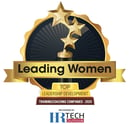
In honor of National Mentoring Month, we asked a few of our own Leading Women experts to share a favorite mentoring moment. Not surprisingly, they confirmed what we’ve known all along, that when women learn business, strategic and financial acumen, they thrive. If you don’t currently have a mentor, January is a great month to find one. #NaMeMo
Nicole Gionet, Senior Consultant
 Mid-way through my career I changed industry from the government/public sector to the telecommunications industry. This was at the cusp of the telecommunication boom (and bubble) in the late 90’s. As a relatively new and fast changing industry, I knew nothing about telecom beyond the telephone and rudimentary email/web system.
Mid-way through my career I changed industry from the government/public sector to the telecommunications industry. This was at the cusp of the telecommunication boom (and bubble) in the late 90’s. As a relatively new and fast changing industry, I knew nothing about telecom beyond the telephone and rudimentary email/web system.
In order to be successful in my role, I needed to learn and understand my new company’s business. I asked a telecom engineer/business leader to meet with me once a week to explain complex network drawings, where the industry was heading, our company’s product and services strategy, and where all this fit together in the grand scheme from a customer and competitive landscape.
I used the same approach when I needed to sharpen my financial acumen. I regularly sat with a finance expert who walked me through the different lines of a P&L and quarterly earnings results.
These two somewhat informal mentoring initiatives helped me, over time, to become the head of HR for this global organization with 75,000 employees and $14 billion in revenue.
Erin Defoyd, Director, Strategic Client Solutions
 Early in my career, I began working for a global organization where my manager was not based in the same office, or country as me. They were also most often members of a global or executive leadership team. It therefore became essential that I personally and proactively initiate mentoring opportunities, as they were not happening as naturally as they were for many of my peers who reported to leaders that sat just down the hall from them.
Early in my career, I began working for a global organization where my manager was not based in the same office, or country as me. They were also most often members of a global or executive leadership team. It therefore became essential that I personally and proactively initiate mentoring opportunities, as they were not happening as naturally as they were for many of my peers who reported to leaders that sat just down the hall from them.
Each year during my annual review I would ask my manager to consider 3 colleagues who she or he thought would be valuable for me to spend mentoring time with in the year to come – in my home office and that of my manager’s. My goal was to ensure there were opportunities for my boss to hear and learn about my interactions with other leaders, up close and afar.
There was also value in selecting 3 different types of mentoring leaders each year, because it ensured that the discussions and development opportunities could be targeted in 3 key areas:
- Someone who was a level above me within my current team – providing an opportunity to understand their career path, and keys to advancement.
- Someone who was responsible for the business and financials of one our key products – so I could understand the inner workings and design of the product, how it would meet client needs, and how our company benefits.
- Someone who worked closely with, or was a peer of my boss – where the focus could be centered on the disciplines of leadership.
Having this as a proactive part of the annual review, provided a strategic opportunity to convey my personal and career aspirations to advance, know the business, and lead.
Linda Ferraro, Senior Consultant
 Early in my career, I applied for a role that was new to the company and entailed cross-functional coordination of production, procurement and engineering groups. It was
Early in my career, I applied for a role that was new to the company and entailed cross-functional coordination of production, procurement and engineering groups. It was
military shipbuilding, and while pretty traditional, was on the cusp of change.
While confident of my experience and qualifications to land this role, the initial person chosen for the role of Team Lead was a peer. I sought out my first manager at the company, who had moved on to another position, but had stayed available as a mentor to me. When I shared with him why I believed the first assignment should have gone to
me, he keenly shifted the conversation and asked me what my true objective was in moving to this role.
He helped me understand that this new design-build team concept signified a transformation in the way internal relationships and processes would drive manufacturing for years to come.
He asked me if I wanted to be a part of leading that change and helping to mold and interpret strategy? If the answer was yes, then this was not about who got the first team lead assignment, but the impact within and beyond any team. In that moment, I learned about the importance of thinking strategically. The design-build team concept was revolutionary in this manufacturing environment and my mentor helped me focus on that. It’s something I’ve never forgotten.
Yes, I did land the next Team Lead role, but as a more thoughtful business leader than if it had been the first.
If you would like to talk more about how Leading Women can help you meet your organization's mentoring goals please contact us!







